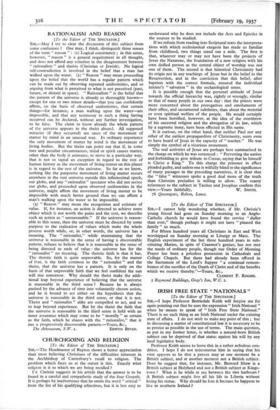CHURCHGOING AND RELIGION
[To the Editor of THE SPECTATOR.]
Sitt,—The Headmaster of Repton shows a better appreciation than most believing Christians of the difficulties inherent in the Archbishop of Canterbury's recall to religion. The problem which faces us at the outset is this. Exactly what religion is it to which we are being recalled ?
Er. Christie suggests in his article that the answer is to be found in a careful and sympathetic study of the four Gospels. It is perhaps by inadvertence that he omits the word " critical " from the list of his qualifying adjectives, but it is less easy to understand why he does not include the Acts and Epistles in the sources to be studied.
If we refrain from reading into Scriptural texts the interpret*, tions with ..which ecclesiastical exegesis has made us familiar from childhood, two things stand out a mile. The first is that, whatever may or may not have been the projects of Jesus the Nazarene, the foundation of a new religion with his own deified person as the central object of worship was not one of them. The second is that historical Christianity had its origin not in any teachings of Jesus but in the belief in the Resurrection, and in the conviction that this belief, after baptism with the correct formula, ensured the individual initiate's " salvation " in the eschatological sense.
It is possible enough that the personal attitude of Jesus towards the official hierarchy was, rightly or wrongly, similar to that of many people in our own day.: that the priests were more concerned about the prerogatives and emoluments of their office, and sacramental subtleties, than about the material or even spiritual welfare of the people. He would certainly have been horrified, however, at the idea of the overthrow of his ancestral religion and the abrogation of its law, which by a supreme irony, have been effected in His name.
It is curious, on the other hand, that neither Paul nor any Other of the earliest propagandists of Christianity, seem even to have heard of Jesus in the capacity of "teacher." He was simply the symbol of a vicarious atonement.
The real activities of Jesus are perhaps best summarised in the charge on which he was sentenced : "Perverting the nation and forbidding to give tribute to Caesar, saying that he himself is Christ a King." To this charge the prisoner in effect pleaded guilty, and unless one is wilfully blind to the significance of many passages in the preceding narratives, it is clear that the " false " witnesses spoke a good deal more of the truth than Christian prejudice is willing to allow. The scanty references to the subject in Tacitus and Josephus confirm this
view.—Yours faithfully, W. SMITH. 78 Queensgate, Bolton, Lancs.














































 Previous page
Previous page